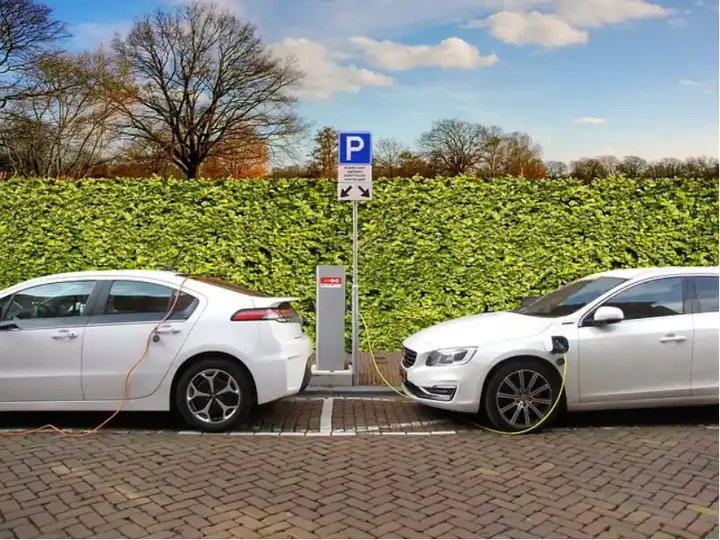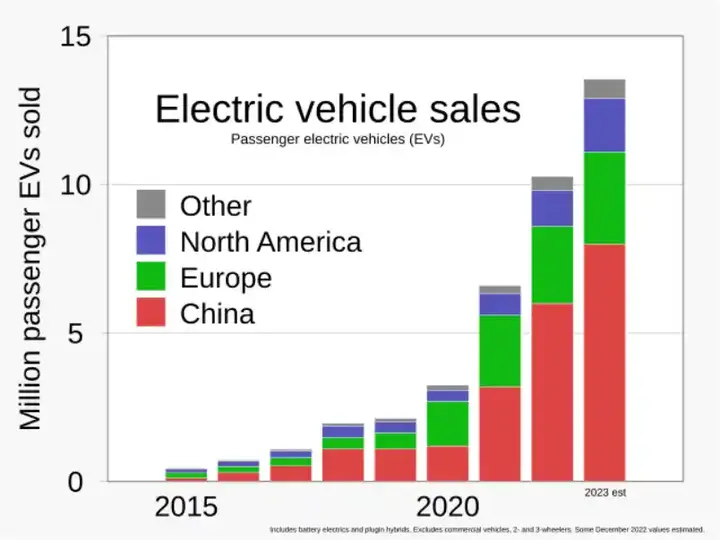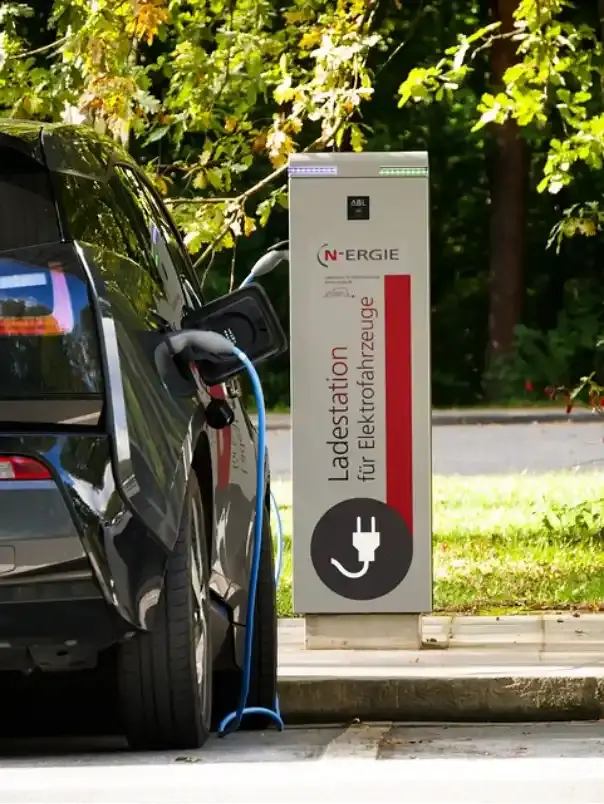Are electric cars actually making sales? Which countries are leading the way?
In recent years, electric vehicles have become the focus of great attention in the transportation sector due to the growing awareness of the importance of environmental sustainability and the advancement of technology. With growing concern about climate change and the impact of carbon emissions, many governments and companies are moving towards adopting electric vehicles as a clean and environmentally friendly alternative to traditional fossil-fuel-powered cars. Electric vehicles offer innovative solutions to reduce dependence on fossil fuels and reduce harmful emissions, making them an attractive option for many consumers around the world. But the question remains: Will electric vehicles actually generate sales that transform the traditional car market? And which countries are leading this change towards a more sustainable future? In this article, we will review the state of the electric vehicle market, the challenges facing this sector, and the countries that are at the forefront in adopting this promising technology. We'll look at the factors driving consumers towards electrification, and the environmental and economic benefits these shifts can bring to the global market.
Recommend
Show key points
- Electric vehicles are gaining global attention due to environmental concerns and advancements in technology that make them a viable alternative to traditional cars.
- Despite impressive sales growth exceeding one million units annually, EVs still face obstacles such as high production costs and limited charging infrastructure.
- Countries like Norway, China, and the United States are leading the shift to electric mobility through supportive policies and significant investments in infrastructure.
- ADVERTISEMENT
- Efforts to improve battery efficiency and driving range are central to making electric vehicles more appealing and competitive in the automotive market.
- The environmental benefits of electric vehicles include reduced carbon emissions and improved air quality, which support global climate goals.
- Economically, EVs offer lower operating and maintenance costs compared to traditional vehicles, making them an increasingly attractive choice for consumers.
- Continued innovation and government support are critical factors that will determine whether electric vehicles can transform the global car market.
The state of the electric vehicle market

The electric vehicle market has witnessed remarkable growth in recent years, driven by technological developments and government incentives. According to industry reports, sales of electric vehicles have skyrocketed, surpassing one million units sold last year. This growth reflects an increased awareness of the importance of environmental sustainability and a desire to reduce carbon emissions. Despite this growth, significant challenges still face the market, such as the high cost of production and the lack of electric vehicle charging infrastructure. However, major automotive companies such as Tesla, Nissan, and Chevrolet continue to drive innovation to meet growing demand and overcome these challenges. In addition, there is an increase in investments in research and development to improve battery efficiency and expand the driving range, enhancing the attractiveness of electric vehicles to consumers.
The challenges facing electric vehicles

Despite the significant growth in electric vehicle sales, there are many challenges facing the industry. One of the most prominent challenges is the high cost of production, as lithium-ion batteries still account for a large part of the cost of a car. In addition, there is a lack of charging infrastructure, making it difficult for users to find adequate charging stations, especially in rural areas. There are also sustainability challenges, as producing batteries requires scarce natural resources and an energy-intensive manufacturing process. However, companies and governments are working to overcome these obstacles by investing in the development of new technologies and building more charging stations. In addition, there are ongoing efforts to improve the efficiency of batteries and make them more sustainable and environmentally friendly.
Countries that lead in the adoption of electric vehicles

Some countries are leading the world in the adoption of electric vehicles thanks to supportive government policies and fiscal incentives. Norway is one of the leading countries in this field, with electric vehicles making up a large proportion of the total cars sold. The Norwegian government provides generous incentives including tax breaks and reductions in road tolls, making buying electric cars more attractive. In addition, China is the largest market for electric vehicles in the world, thanks to supportive government policies and significant investments in charging infrastructure. The United States also occupies a prominent position in this area, seeing strong sales to companies such as Tesla that dominate the American market. Countries such as the Netherlands and Germany are also contributing significantly to the adoption of electric vehicles through supportive policies and infrastructure investments.
Environmental and Economic Benefits of Electric Vehicles

instead of fossil fuels, which significantly reduces carbon emissions and contributes to improved air quality. This shift towards electric vehicles helps combat climate change and reduce environmental pollution. In addition to environmental benefits, electric vehicles offer numerous economic benefits. They require much less maintenance than conventional cars, reducing maintenance and repair costs. In addition, the operating costs of electric vehicles can be lower thanks to the high efficiency of electric motors and the lower cost of electricity compared to fossil fuels. Governments also provide financial incentives and tax breaks to encourage consumers to buy electric vehicles, making them a sustainable long-term economic option.

In conclusion, recent data shows that electric vehicles are achieving increasing sales and gaining popularity globally, reflecting a tangible shift towards sustainable transportation. Despite multiple challenges, such as the cost of production and shipping infrastructure, the ongoing efforts of governments and businesses contribute to overcoming these obstacles. Norway, China, and the United States are leading this transformation, supported by supportive government policies and significant investments in infrastructure development. Electric vehicles are not only an environmental option, but also offer tangible economic benefits that include reduced maintenance and operating costs. As technological innovations and improvements in battery efficiency continue, the electric vehicle market is expected to continue to grow and expand. If you are looking for a new car, choosing an electric car can be a step towards a more sustainable and economical future. Thanks to the many benefits they offer, electric vehicles today are a sustainable option that enhances efforts to combat climate change and improves the quality of life.
![]()
The most fascinating discoveries we have made to explore Jupiter
Jupiter’s Great Red Spot, a massive storm lasting centuries, and the mysterious, possibly liquid core make it a planet full of extremes. Its moons—especially Europa with its hidden ocean—offer exciting clues about extraterrestrial life. With Juno and upcoming missions, the future of exploring this gas giant looks thrilling. more- ADVERTISEMENT
![]()
The most important job market skills - how to become a graphic designer?
Graphic design is a creative field where your imagination meets visual communication. It’s not just about art—it’s about problem solving, storytelling, and expressing ideas. With the right skills, passion, and patience, you can turn your love for design into a rewarding profession that AI can’t fully replace. more- ADVERTISEMENT
![]()
The splendor of nature and the challenge of conditions in the oasis of Taghit in western Algeria
Taghit is a hidden gem in western Algeria, where golden dunes meet ancient history. Adventure seekers can sandboard down towering dunes, explore mysterious caves, or discover 20,000-year-old rock carvings. The ancient walled city of Kassar, once forgotten, is now being restored to its former glory. more- ADVERTISEMENT
![]()
A system to remember everything: clear, simple, and effective
Want to remember everything better? Use systems like visualization, mnemonics, and spaced repetition. Methods like the Loci technique or tools like mind maps can make memory work smoother. It's not complicated—find what fits you and make learning easier and less stressful. more- ADVERTISEMENT
![]()
The Shintoan Value Behind Japanese Aesthetics
Japanese aesthetics isn’t just about fleeting beauty like cherry blossoms—it's about creating harmony between nature and human touch. From food that enhances natural flavors, to tatami mats crafted from carefully chosen straw, to beauty trends that embrace imperfections, Japan finds beauty in making things feel naturally perfect. more- ADVERTISEMENT
![]()
How to reduce risk and keep your business stable?
Effective risk management helps protect your business assets, improve decision-making, and avoid costly disruptions. By identifying, assessing, and addressing potential risks, you can ensure smoother operations and even uncover new opportunities. Regular updates, employee involvement, and proper tools can keep your risk strategy strong and your business steady. more- ADVERTISEMENT
![]()
How can I stop wasting time?
Distractions like phones and social media eat up your time. Create routines, set priorities, and work in focused time blocks. Keep your phone silent, avoid multitasking, and believe in yourself to overcome procrastination. Small changes can make your days much more productive. more- ADVERTISEMENT
![]()
At each moment, there are about 2,000 thunderstorms occurring on Earth.
Thunderstorms are powerful and common, with up to 2,000 happening worldwide at any time. Florida sees the most in the U.S., while Venezuela’s Lake Maracaibo holds the record for lightning. Remember: if you hear thunder, go inside—lightning can be deadly, even from miles away. more- ADVERTISEMENT
![]()
A good leader knows he doesn't know everything: lessons my old sergeant didn't learn
Great leaders don’t pretend to know it all—they lead with humility, collaboration, and a willingness to learn. In today’s fast-changing world, success comes from empowering teams, embracing change, and valuing diverse perspectives, not clinging to outdated notions of authority. more- ADVERTISEMENT
![]()
Can companies avoid Kodak's future fate?
Can Companies Evade the "Kodak" Destiny in The Future? more- ADVERTISEMENT





















